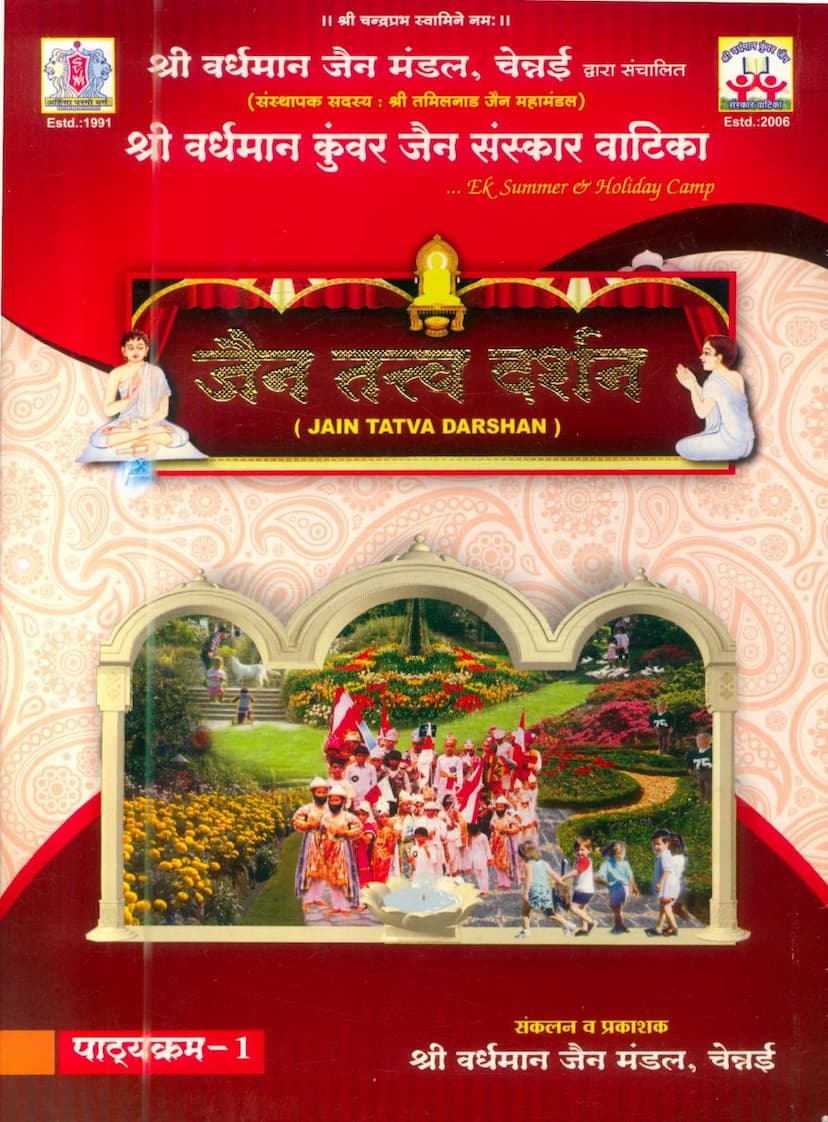Jain Tattva Darshan Part 01
Added to library: September 2, 2025

Summary
Here's a comprehensive summary of the provided Jain text, "Jain Tattva Darshan Part 01":
Book Title: Jain Tattva Darshan Part 01 Author(s): Vardhaman Jain Mandal Chennai Publisher: Vardhaman Jain Mandal Chennai Catalog Link: https://jainqq.org/explore/006114/1
Overview:
"Jain Tattva Darshan Part 01" is the first part of a curriculum designed for young learners, aiming to impart fundamental knowledge of Jain philosophy and practices. Published by the Vardhaman Jain Mandal, Chennai, this book serves as an educational tool to guide children towards understanding and adhering to Jain principles. It is dedicated to the memory of Pandit Bhushan Panditvary Shri Kunvarjibhai Dosi, a revered scholar who spread Jain knowledge for 45 years in Chennai.
Key Themes and Content:
- The Importance of Knowledge: The book emphasizes that knowledge is light, dispelling the darkness of ignorance. True knowledge, or samyak gyan, cultivates discernment, enabling one to differentiate between what is worthy of being known (gyey), what should be avoided (hey), and what should be embraced (upadey). Ignorance leads to actions that bind negative karma.
- Nurturing Young Minds: Children are described as being like blotting paper, readily absorbing the teachings and values instilled by parents and educators. The book highlights the importance of providing Jain philosophy in a way that is accessible and engaging for them, focusing on understanding, meaning, and practical application of scriptures, not just memorization.
- The Role of Sanskar Vatika: The "Shri Vardhaman Kunwar Jain Sanskar Vatika" was established in 2006 to provide this essential Jain education to children. It has grown significantly, aiming to spread Jain knowledge globally. The initiative seeks to instill deep faith and character in Jain children through dedicated teachers.
- Curriculum Structure: This volume, "Jain Tattva Darshan (Part 1)," is part of a larger series (Parts 1-9). The curriculum aims to equip students with a strong foundation in Jain principles, making them devout and knowledgeable Jains. The books are developed with guidance from various Jain scholars and monks.
- Dedication to Pandit Kunvarjibhai Dosi: The book pays tribute to Pandit Kunvarjibhai Dosi, recognizing his immense contribution to spreading Jain knowledge. His dedication to clarity in pronunciation, purity in rituals, and inspiring pilgrimages is celebrated. The publication is a continuation of the knowledge flame he ignited.
- Content Breakdown (Table of Contents): The book covers a wide range of topics, structured into various sections:
- Tirthankar Parichay: Introduces the 24 Tirthankaras, their names, complexions, and images.
- Kaavya Sangrah (Poetry Collection): Includes prayers, devotional songs (stutis), and specific verses dedicated to Tirthankaras like Parshvanath.
- Jin Pooja Vidhi (Jain Worship Rituals): Details the methods for performing Arti (worship with lamps) and Mangal Divo (auspicious lamp).
- Gyan (Knowledge): Lists the five types of knowledge in Jainism (Mati Gyan, Shrut Gyan, Avadhi Gyan, Manahparyav Gyan, Keval Gyan).
- Navpad: Names the nine foundational principles of Jainism.
- Naad, Ghosh (Chants and Exclamations): Features various religious chants and affirmations.
- Mere Guru (My Gurus): Provides a section on correcting common colloquialisms when addressing Jain monks and nuns.
- Dincharya (Daily Routine): Outlines a recommended daily schedule for a Jain follower, including spiritual practices and daily activities.
- Bhojan Vivek (Dietary Discernment): Guides on what foods are considered pure and impure (abhakshya) and the impact of diet on one's mind and karma.
- Mata-Pita ka Upkaar (Parents' Benevolence): Emphasizes the importance of respecting and honoring parents.
- Jivdaya - Jayana (Compassion for Living Beings): Stresses the practice of Jivdaya (non-violence towards all living beings), including carefulness while walking, feeding animals, and conserving water.
- Vinay - Vivek (Humility and Discernment): Highlights the importance of showing respect and proper conduct towards elders, gurus, and teachers.
- Samyak Gyan: Lists the eight types of karma and the nine Tattvas (principles) of Jainism. It also emphasizes the importance of devotion and prayer.
- Jain Bhugol (Jain Geography): Describes the Jain cosmological structure, including the Lok (universe) and the different realms of existence.
- Sutra evam Vidhi (Sutras and Rituals): Explains various Jain mantras and rituals, including the Pancha Paramesthi Namaskar Sutra (Navkar Mantra), Panchindriya Sutra, Khamasaman Sutra, Ichchhakarya Sutra, and Abhuththiyo Sutra. It also details the Navkarsi Pacchakhan (fasting ritual) and Guru Vandana method.
- Kahani Vibhag (Story Section): Narrates inspiring stories:
- Vardhaman Kumar: The childhood story of Lord Mahavir demonstrating bravery by facing a monster, earning him the name "Mahavir" (greatly courageous).
- Haathi ki Karuna (Compassion of the Elephant): An elephant's selfless act of saving a rabbit by holding its leg up for three days, leading to its death but earning it a virtuous rebirth as Prince Meghkumar.
- Shri Amar Kumar: A story about a boy named Amarkumar who was offered as a sacrifice but was saved by divine intervention and later became a monk, achieving spiritual liberation.
- Prashnottari (Question and Answer): Tests the reader's comprehension with fill-in-the-blanks, true/false, matching, and short-answer questions.
- Poems and Games: Includes English poems related to Tirthankaras and a game focusing on right conduct (sadachar) through simple yes/no questions about daily practices.
- Chitraveli (Illustrations): Features visual representations of key Jain concepts like knowledge, vision, conduct, and austerity.
- Aaj ki Maza, Narak ki Saza (Today's Fun, Hell's Punishment): Illustrates the consequences of negative actions with simple visuals.
Educational Approach:
The book uses a combination of Hindi and English for better accessibility. It employs simple language, storytelling, and visual aids to make complex Jain concepts understandable for children. The inclusion of poems, games, and stories aims to foster interest and retention.
Overall Purpose:
"Jain Tattva Darshan Part 01" is a foundational text designed to instill the core values and knowledge of Jainism in young minds. It aims to create future generations of Jains who are not only knowledgeable but also live by the principles of non-violence, compassion, truthfulness, and ethical conduct. The publication represents a significant effort by the Vardhaman Jain Mandal, Chennai, to preserve and propagate Jain teachings for the benefit of society.